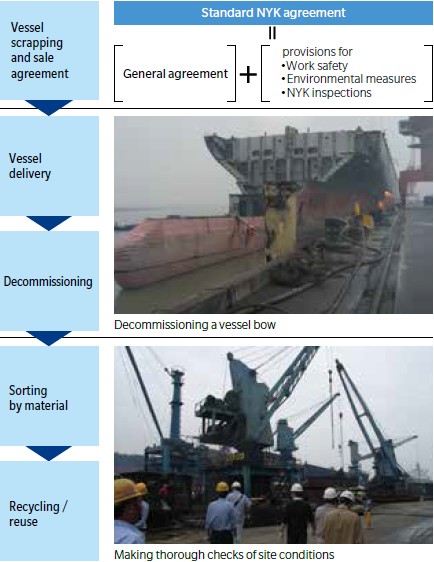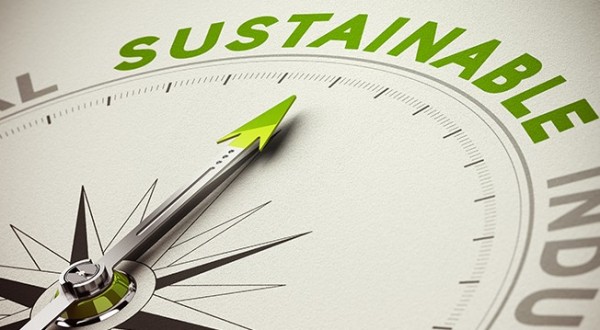Many new social, environmental and economic challenges are emerging in the global ocean governance; new technologies offer the potential for radical improvements in shipping efficiency, the market is totally changing, fuel costs are rising and becoming less predictable than used to be. However, shipping industry weathers the storm implementing sustainable best practices.
“K” LINE Group’s Vision 5050: Securing Blue Seas for Tomorrow
“K” LINE Environmental Vision 2050 – Securing Blue Seas for Tomorrow,” is a long-term environmental management vision which was introduced in 2015 and set concrete numerical targets to conduct environmental preservation activities. Some of the targets are
- To continue avoiding serious marine accidents and be the industry’s leader in protection of the ecosystem
- To replace majority of energy currently consumed with new energy sources
- To reduce CO2 emissions by half
In view of the outlook of future society and the relationship between business characteristics and the global environment, the company has identified some priority issues that it will face and overcome.
- Rebuilding Portfolio Strategy
- Emphasizing Advancement of Management and Functionspecific Strategies
- Pursuing ESG Initiatives
Furthermore, they have set four interim milestones to be reached by 2019, the year marking the 100th Anniversary of the foundation of “K “LINE:
Reducing CO2 emissions by 10% from 2011 level [accomplished in 2015]
- To continue avoiding causing serious marine accidents
- To introduce LNG-fueled carriers
- To build and implement environmental flagships
TOTAL’s Clear Strategy for sustainable growth
TOTAL is deploying a clear strategy, based on four priorities as well. The strategy integrates the challenge of climate change using a point of reference the 2OC Sustainable Development Scenario of the International Energy Agency (IEA):
- Drive profitable and sustainable growth in Exploration & Production activities, with priority given to the production of gas (he fossil fuels that emits the least amount of carbon dioxide) and constant emphasis on producing at a competitive cost by ensuring strict investment discipline.
- Carry on enhancing the competitiveness of major integrated refining and petrochemical platforms.
- Increase the distribution of petroleum products, particularly in high-growth regions and offer innovative solutions and services that meet the needs and of customers.
- Expand along the full gas value chain by unlocking access to new markets and develop profitable low carbon businesses, in particular renewable energies and biofuels.
Last but not least, TOTAL intends to strengthen its involvement in the circular economy and implement a program of actions, particularly in purchasing, waste management, new ranges of polymers solarization of service stations and improved efficiency energy.
Gard P&I Club: Building competence
The Gard P&I Club has formed strategic alliances with educational bodies to build competence and capabilities internally and externally:
- Strengthened cooperation with the Agder University (UiA) in Norway and joined their circle of business partners to collaborate to support the university’s research. Set up made-to-measure MBAs for Gard’s leadership programme participants, joined the project developing the future UiA strategy and become one of their partners in the first dedicated centre for research on Artificial Intelligence (AI) in Norway.
- Continue to support the World Maritime University (WMU), a specialised agency of the United Nations and a centre of excellence for maritime post-graduate education and research. Since 2011, they have funded seven students at the university. Gard’s Chief External Affairs Officer also serves on the Executive Board.
- For the past four years, the Club has supported the Institute of Maritime Law (IML) at the University of Southampton, England. Included in their support to IML is the Gard Best Student Award which is given to the student with the highest mark in the subject of Carriage of Goods. The Award includes a monetary award intended to cover educational costs and an one-day introduction to Gard.
- Supported of the Arendal International School since its launch in 2006. Over the past decade, the school has grown from 20 to 180 students, from over 50 countries by a staff with roots in more than 14 countries. Gard’s Chief External Affairs Officer serves on the school’s board.

NYK: Scrapping Ships in an eco-friendly way
As the IMO Convention for Ship-Recycling 2009 requires, NYK Group prepares inventory lists of the volumes and locations of hazardous materials on board and posts the lists inside its vessels. The Group has also created a scrapping policy that focuses on securing safe, stable scrapping locations, underscores the importance of scrapping vessels in a n environmental-conscious way, and takes the IMO Guidelines and other items into consideration. In line with this policy, the Group selects scrapping yards that not only feature environmentally friendly conditions but also emphasize work safety. Under its unique agreements pertaining to the sale of vessels for scrapping, the Group also conducts on-site inspections upon delivery as needed to confirm that the safety and environmental conditions of the corresponding locations are compliant with the provisions of the agreements.






























































